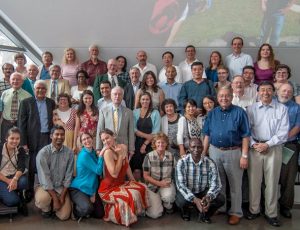MSU and the USDA's Avian Disease and Oncology Laboratory (ADOL) Celebrate 75 Year History at International Symposium

Marek's disease, a highly contagious tumor-causing viral disease, was once the most economically devastating disease in the poultry industry. In its acute form, it can wipe out up to 80 percent of a flock of chickens. In East Lansing, the Avian Disease and Oncology Laboratory of the USDA Agricultural Research Service (USDA-ARS) has worked since 1939 to keep avian diseases, including Marek's, in check.
Michigan State University and the Avian Disease and Oncology Laboratory recently co-hosted the 10th International Symposium on Marek's Disease and Avian Herpesviruses. More than 150 researchers, veterinarians, students, technicians, and industry professionals from 21 countries gathered for the event in East Lansing, Michigan, from July 20 to 23, 2014.
Research, the development of effective vaccines, and breeding lines of chickens resistant to the disease have been an enormous success. But new and more virulent strains continue to emerge—so the battle against the disease continues.
"Marek's disease is one of the best success stories in all of animal agriculture," says Dr. Richard Witter (MSU DVM '60), director of the Avian Disease and Oncology Laboratory from 1976 to 1998. "If vaccines were to fail, the existence of the poultry industry as we know it would be in jeopardy," says Witter, whose leadership in the battle against Marek's disease has been recognized by numerous awards and honors.
MSU and the Avian Disease and Oncology Laboratory
The Avian Disease and Oncology Laboratory was formed in 1939 during a poultry epidemic that was later found to include Marek's, avian leucosis virus, and other viral diseases. Surrounded by MSU land, the university and the laboratory have maintained a special relationship for 75 years now.
Laboratory scientists have collaborated with MSU researchers, have served on the committees of MSU graduate students, taken courses and earned degrees, and been appointed adjunct faculty. Witter observes, "This mutually beneficial relationship quickly became one of the cornerstones of the Laboratory's programs and has endured."
Beyond the chicken
Marek's disease research has been critical to protecting flocks, but also has yielded findings that have advanced research in human health.
Investigation into the disease in chickens—particularly the mechanisms of protection and of pathogenesis—makes it an important model for human cancer. Marek's disease research yielded the discovery that a virus causes Marek's disease. This was the first discovery of a cancerous condition caused by a virus. For both veterinary and medical research, this had far-reaching consequences. Later, the Marek's vaccine became the first effective cancer vaccine for any species,
"You can focus on both the infectious nature of the disease and also on its ability to transform cells into cancer cells—two different issues entirely," says Witter. "There is the possibility that basic science advances in Marek's could advance the understanding of cancer in other species."
Celebrating 75 years
The symposium hosted 12 keynote and invited speakers, including participants of the special panel "Perspectives on Marek's disease breakthroughs since the 1960s."
Some of the most important contributors to Marek's disease research and prevention provided insight into the advances made during the last decades and discussed current and future research possibilities. Panelists included Peter Briggs, Bruce Calnek, Hsing-Jien Kung, Karel Schat, Jagdev Sharma, Egon Vielitz, and Richard Witter in a moderated discussion.
This panel was filmed, along with individual interviews, and will be made available to attendees on a DVD. Additionally, the organizing committee published Avian Disease and Oncology Laboratory: a 75 year history, written by Witter.
Among the event's sponsors were, from MSU, the College of Veterinary Medicine, AgBioResearch, the Office of the Vice President for Research and Graduate Studies, International Studies and Programs, and the College of Veterinary Medicine's Diagnostic Center for Population and Animal Health, which also provided administrative support.
